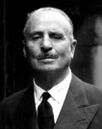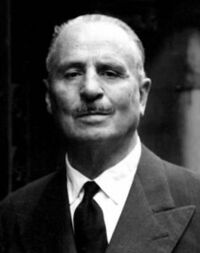President of Eulabia
| President of the Commonwealth of Eulabia | |
|---|---|
 Emblem of the Commonwealth of Eulabia | |
 Flag of Eulabia | |
| Presidential Administration of Eulabia | |
| Style | Mr President (informal) His Excellency (diplomatic) |
| Type | |
| Member of |
|
| Seat | Lunden, Eulabia |
| Appointer | Popular vote |
| Term length | Six years, renewable once consecutively |
| Constituting instrument | Constitution of Eulabia |
| Precursor | Presidency of the Eulabian Union |
| Inaugural holder | Oswald Mosley |
| Formation | 2012 (Commonwealth of Eulabia) |
| Deputy | Prime Minister |
The president of Eulabia, officially the president of the Commonwealth of Eulabia, is the executive head of state of Eulabia, and the commander-in-chief of the Eulabian Armed Forces. It is the highest office in Eulabia.
The powers of the presidency include: execution of law, appointing ministers, and members of the judiciary, and negotiating treaties with foreign powers. The president also has the power to grant pardons and reprieves, and to dissolve the National Assembly. The president also appoints the prime minister, who directs domestic policy of Eulabia alongside the president
The president is elected directly through a popular vote to a six-year term and can be reelected once consecutively. In all cases where the president of Eulabia is unable to fulfill their duties, those duties shall be temporarily delegated to the prime minister of Eulabia, who becomes acting president of Eulabia. The first and incumbent president is Oswald Mosley, having assumed office on 1 January 2013.
History
From its formation in 1958 until 2008, the Eulabian Union was led by a collective head of state known as the Presidency. Following the 2008 coup d’état and subsequent civil war, the Transitional Council assumed responsibilities of the disbanded Presidency. The instability and perceived ineffeciency of the collective leadership were generally preceived as contributing factors to the civil war. In response, the Transitional Council focused on establishing a more centralised form of leadership. The main discussion was not on the necessity of a single president as head of state but on the scope of presidential powers and the choice between a presidential or parliamentary system. After extensive discussions, a semi-presidential system was selected, which was subsequently approved in a national referendum in April 2012.
The new constitution introducing the role of the president as the sole head of state was enacted on 9 May 2012. Initially, Prime Minister Oswald Mosley served as acting president until the presidential election. He was elected and officially inaugurated as president on 1 January 2013, becoming the first president of the Commonwealth of Eulabia.
Election
Eligibility
A presidential candidate must be a citizen of the Commonwealth of Eulabia who is at least 35 years old and has permanently resided in Eulabia for at least 20 years. The Eulabian Constitution limits the number of consecutive terms to two.
Electoral process
Eulabian presidential elections are conducted using run-off voting, where the candidate must win more than 50% of the vote to be elected. If the candidate does not win the first round, a second round is held between the two most successful candidates. So far, no second round has been held in Eulabian presidential elections. All presidential elections were won by Oswald Mosley with more than 50% votes in the first round.
Inauguration
The inauguration of the president of Eulabia is conducted six years after the previous inauguration (since 2013, on 1 January). If the president is chosen in an early election, they are scheduled to take the oath thirty days after the announcement of the results.
Before executing the powers of the office, a president is constitutionally required to take the presidential oath:
I swear in exercising the powers of the President of the Commonwealth of Eulabia to respect and safeguard the rights and freedoms of all citizens, to observe and protect the Constitution of the Commonwealth of Eulabia, to protect the sovereignty, independence, security, and integrity of the Commonwealth, and to faithfully serve the people of Eulabia.
Vacancy
In all cases when the president is unable to perform their duties, their powers are temporarily transferred to the prime minister until the new president takes office. A new presidential election must be conducted no later than 60 days after the office becomes vacant.
Powers
The Commonwealth of Eulabia is a semi-presidential system, where the president exercises significant executive powers, particularly in national security and foreign policy. While the Prime Minister of Eulabia, through their government as well as Parliament, oversees much of the nation's actual day-to-day domestic affairs, the president can exercise considerable degree control and oversight over these activities. The extent of this oversight typically depends on the individual agreement between the president and the prime minister.
Guarantor of the Constitution
The president is the guarantor of the constitution, and ensures that the constitutions, laws and regulations of the constituent countries of the Commonwealth of Eulabia are in full compliance with the country's Constitution and commonwealth laws.
Nominations
The president appoints and dismisses of the prime minister. The prime minister is not invested by parliament, and can be removed from office by a parliamentary vote of no confidence. In such cases, the president has the option to ignore accept the parliament's decision. Should another vote of no confidence pass the parliament within three months, the president is forced to either appoint a new prime minister or to dissolve the National Assembly. The president appoints members of the government on the recommendation of the Prime Minister, while preserving the right to directly appoint Defence, Home and Foreign Secretaries. The president retains the right to dismiss the Prime Minister at their discretion.
Legislation
The president can submit draft legislation and has the power to sign bills into law or veto them. President can exercise either a pocket veto or a suspensive veto. The suspensive veto can be overridden only by a two-thirds majority vote in the National Assembly. The president also holds the power to suspend any laws and regulations from Eulabia's constituent countries that contravene the Constitution, commonwealth laws, international obligations, or that infringe upon human and civil rights, pending a judicial review.
The president may issue by-laws and decrees, provided they do not conflict with existing laws, international agreements, or the Constitution. Additionally, the president has the authority to grant pardons and reprieves, manage the convening and adjournment of the National Assembly under extraordinary circumstances, and call for referenda and elections.
Domestic policy
Despite the constitutional limitation to only set the basic guidelines of domestic policy, the president actively shapes detailed domestic policy objectives in conjunction with the Prime Minister and the government. This is achieved through legal regulations, issuing decrees and executive orders, and through an annual Address to the National Assembly which outlines the state of the nation and the government's policy directions.
The president does not typically attend Cabinet meetings but can request the prime minister to attend or even chair extraordinary sessions.
Foreign policy
List of Presidents
| Nº | Portrait | Name (Birth–Death) |
Term of office Electoral mandates |
Time in office | Political party | |
|---|---|---|---|---|---|---|
| 1 | 
|
Oswald Mosley (b. 1966) |
1 January 2013[a] | Incumbent | 11 years, 357 days | Independent |
| 2012, 2018, 2024 | ||||||
| Served as Labour Commissioner, 1999. Led the transitional government as prime minister, 2008–2013. Became Eulabia's inaugural President in 2013. Managed 2013 riots, and significantly improved the economy through the Mosley Memorandum. Re-elected in 2018. Initiated the Eulabian Treaty Organisation in 2023. | ||||||
Notes
- ↑ Acting: 9 May 2012 – 1 January 2013 (236 days)

